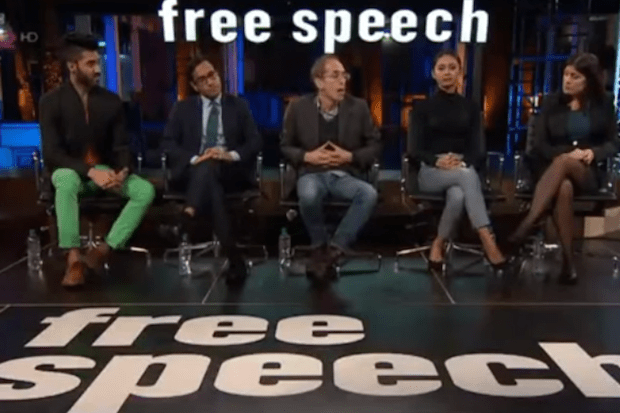Michael Gove was on BBC Question Time the other night, fielding questions about such contentious subjects as education, immigration and benefits. But when he browsed the internet afterwards to see what, if anything, was exercising the web about his performance, he was surprised to discover that his greatest crime had been an innocuous turn of phrase in response to a jibe from David Dimbleby.
Dimbleby had idly wondered why Gove was so disliked by the teaching profession, to which Gove replied that this was a loaded question on the lines of ‘When did you stop beating your wife?’ This elicited a huge outpouring of internet hatred from the usual online victim groups to the effect that it was outrageous that a government minister should make light of the very serious problem of domestic abuse.
No, I wouldn’t have believed this either if I hadn’t myself experienced such immense obtuseness from BBC audiences on two occasions recently. One was Free Speech — a youth debate programme redolent of that old Not The Nine O’Clock News sketch where Griff Rhys Jones tries unsuccessfully to get down with the kids on a show called Hey, Wow! — in which I made the H.M. Batemanesque mistake of pointing out that, thanks to the failed experiment of multiculturalism, there were now parts of inner-city Britain which were effectively Muslim ghettos.
Rather than dispute the premise — not an easy task, given the widespread evidence from Birmingham and Bradford to Luton — the young audience and most of my fellow panellists decided to attack me for my choice of terminology. ‘Ghetto’ was a racist word, they told me. Islamophobic too. The more they hissed and jeered and showed their disapproval of my vile bigotry, you could tell, the more warm and gooey they felt inside. See what good, sensitive, caring, non-judgmental people they all were: uniting as one against the language of hatred and intolerance! (But if you go to Birmingham and Bradford and Luton, I suspect the sectarian problem I’ve described won’t have gone away).
The other occasion was before what should have been a more grown-up and intellectually sophisticated crowd. It was an edition of Any Questions, broadcast from the Thame Literary Festival, so I thought my mostly middle-aged, middle-class, apparently bookish audience would be more than capable of grasping a point I wanted to make about semantics. It was shortly after Lord Freud’s unfortunate remarks about disabled people, when he had been recorded observing with seeming heartlessness that they were ‘not worth the full wage’. I say ‘seeming’ because — as had by that stage in the news cycle became abundantly clear — Lord Freud’s meaning and intent had been wholly decent, honourable and caring.
Yet still it suited the two lefties on the panel — Chuka Umunna and the TUC’s Frances O’Grady — to froth with confected outrage about the alleged offence that had been caused. So I decided to call Umunna on his disingenuousness by asking whether, if a man popped into the pub after a rugger match and said he’d just ‘murdered’ the opposition, Umunna would consider calling the police.
Umunna, as we know, can be a slippery fellow. But I thought I’d got him bang to rights this time. Sure English is a complex language, rich in metaphor, highly dependent on tone and context. But even the thickest native speakers from the lowliest housing estates understand these nuances almost from birth. If they didn’t, they’d be quite incapable of communicating. So it surely beggared belief, I suggested, that a man of Umunna’s intellectual calibre, with his private education, his Manchester degree, and his general smoothy-chops fluency had yet been unable to grasp what Lord Freud had really meant with that ‘not worth the full wage’ remark; that it was a narrow economic point, not a more general one about the esteem or otherwise in which we should hold the disabled.
Well, may you imagine my surprise when, instead of applauding my dissection of the Umunna slime-creature’s nefarious ruse, the audience started jeering me almost as noisily as the kids on Free Speech did. Maybe you could put it down to herd mentality: once one bovine fool starts mooing, they all join in, even when they’re uncertain what exactly they’re mooing about. Or it’s possible that like Gove, I’ve become so established a hate figure that even were I to say something as unexceptionable as ‘that Marcus Wareing from MasterChef has amazingly piercing blue eyes’, I’d still have everyone coming at me with machetes.
What though, if it’s worse than that? What if Orwell’s predictions in his appendix to Nineteen Eighty-Four have come true and the final bastion has fallen to the totalitarian enemy: the English language itself?
Certainly, it’s something I’ve been noticing more in my battles as a journalist and broadcaster. Rarely, if ever, will my ideological enemies engage me on the terms of my argument; almost always their technique will involve focusing on some minor detail — e.g. their supposed offence at the use of the word ‘ghetto’; or, on another issue of Any Questions, my apparently ‘racist’ reference to the stock Irishman, giving directions, who begins ‘Well, if you want to get there you don’t want to start from here’ — and working away at it until, like some raw, swollen, oversqueezed spot, it becomes the thing everyone notices to the exclusion of all else.
Gove’s experiences with that Question Time fit into the same pattern. Because he was being disappointingly emollient and over-reasonable on that particular edition, his enemies had to find some other way of getting at him and did so on the trumped up charge that he was being linguistically insensitive to abused women.
Not so long ago, you could rely on a solid rump of educated people with sound values to give this sort of nonsense very short shrift. No longer, apparently.







Comments